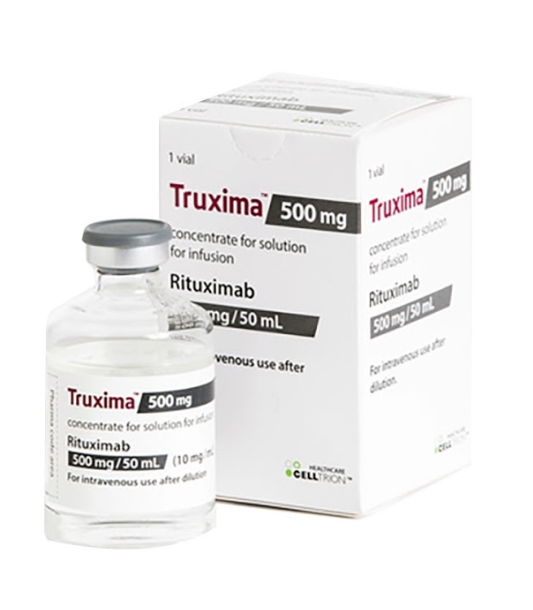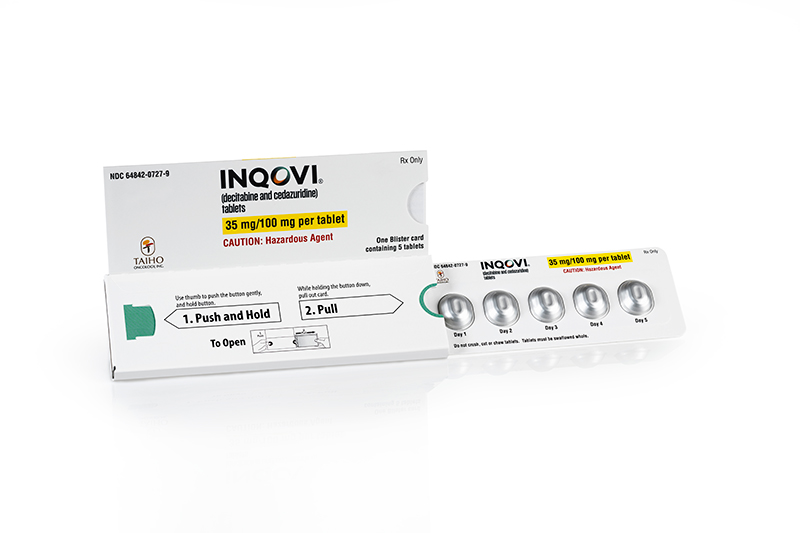Truxima (rituximab) vs Inqovi (decitabine and cedazuridine)
Truxima (rituximab) vs Inqovi (decitabine and cedazuridine)
Truxima (rituximab) is a monoclonal antibody that targets the CD20 protein found on the surface of B cells and is primarily used in the treatment of non-Hodgkin lymphoma, chronic lymphocytic leukemia, and rheumatoid arthritis. In contrast, Inqovi (decitabine and cedazuridine) is an oral hypomethylating agent used to treat myelodysplastic syndromes (MDS) and chronic myelomonocytic leukemia (CMML), conditions that affect the bone marrow and blood. The choice between Truxima and Inqovi would depend on the specific diagnosis and treatment plan recommended by a healthcare provider, as these medications are used for different hematologic conditions and work through distinct mechanisms.
Difference between Truxima and Inqovi
| Metric | Truxima (rituximab) | Inqovi (decitabine and cedazuridine) |
|---|---|---|
| Generic name | Rituximab | Decitabine and cedazuridine |
| Indications | Non-Hodgkin's lymphoma, chronic lymphocytic leukemia, rheumatoid arthritis, granulomatosis with polyangiitis, microscopic polyangiitis | Myelodysplastic syndromes (MDS), chronic myelomonocytic leukemia (CMML) |
| Mechanism of action | CD20-directed cytolytic antibody | Hypomethylating agent (decitabine) and cytidine deaminase inhibitor (cedazuridine) |
| Brand names | Truxima, Rituxan, MabThera | Inqovi |
| Administrative route | IV infusion | Oral |
| Side effects | Infusion reactions, fever, lymphopenia, chills, infection | Fatigue, constipation, hemorrhage, myalgia, mucositis, arthralgia, nausea, dyspnea, diarrhea, rash, dizziness, febrile neutropenia |
| Contraindications | Severe, active infections and severe hypersensitivity to rituximab or any of its components | Hypersensitivity to decitabine or cedazuridine, or any component of the formulation |
| Drug class | Monoclonal antibody | Nucleoside metabolic inhibitor (decitabine); cytidine deaminase inhibitor (cedazuridine) |
| Manufacturer | Celltrion Healthcare, Teva Pharmaceuticals, Genentech (a member of the Roche Group) | Astellas Pharma US, Inc. |
Efficacy
Truxima (rituximab) Efficacy in Leukemia
Truxima, a biosimilar to the original rituximab, is a monoclonal antibody that targets the CD20 antigen on the surface of pre-B and mature B lymphocytes. While Truxima is not primarily indicated for leukemia, it has been used off-label for certain types of this disease, such as chronic lymphocytic leukemia (CLL) and B-cell acute lymphoblastic leukemia (B-ALL). In the context of CLL, rituximab has been shown to improve overall survival and progression-free survival when used in combination with chemotherapy. The efficacy of rituximab in B-ALL is typically evaluated in combination with other chemotherapeutic agents, where it has contributed to improved remission rates and survival outcomes in some patient cohorts.
Inqovi (decitabine and cedazuridine) Efficacy in Leukemia
Inqovi combines two active substances, decitabine and cedazuridine, and is specifically indicated for the treatment of adult patients with myelodysplastic syndromes (MDS), which include certain types of leukemia such as chronic myelomonocytic leukemia (CMML). Decitabine is a hypomethylating agent that reverses abnormal gene silencing in cancer cells, while cedazuridine is included to inhibit the enzyme that breaks down decitabine, thus enhancing its availability and effectiveness. Clinical trials have demonstrated that Inqovi is effective in achieving complete remission or partial remission in a significant percentage of patients with MDS and CMML, leading to its approval for these conditions.
It is important to note that the efficacy of these medications can vary based on the specific subtype of leukemia, the stage of the disease, and the patient's overall health and treatment history. The use of Truxima and Inqovi should be guided by a healthcare professional with expertise in the management of hematological malignancies. Clinical trials and real-world studies continue to provide insights into the optimal use of these medications in various settings of leukemia treatment.
For the most accurate and personalized information regarding the efficacy of Truxima and Inqovi for leukemia, patients should consult their healthcare provider, who can consider the full context of their medical history and current health status. Additionally, ongoing research may further refine the understanding of how these medications can be best utilized in the fight against leukemia.
Regulatory Agency Approvals
Truxima
-
European Medical Agency (EMA), European Union

-
Food and Drug Administration (FDA), USA

-
Health Canada

-
Therapeutic Goods Administration (TGA), Australia

-
Medsafe (NZ)

Inqovi
-
Food and Drug Administration (FDA), USA

-
Health Canada

Access Truxima or Inqovi today
If Truxima or Inqovi are not approved or available in your country (e.g. due to supply issues), you can access them via Everyone.org.
How it works

Make an enquiry
Choose the medicine you want to buy, answer a couple of questions, and upload your prescription to speed things up. We’ll get back to you within 24 hours.


Make an enquiry
Choose the medicine you want to buy, answer a couple of questions, and upload your prescription to speed things up. We’ll get back to you within 24 hours.


Breeze through the paperwork
We'll guide you through the required documents for importing unapproved medicine, ensuring you have all the necessary information.


Get a personalized quote
We’ll prepare a quote for you, including medicine costs and any shipping, administrative, or import fees that may apply.


Receive your medicine
Accept the quote and we’ll handle the rest - sourcing and safely delivering your medicine.

Some text on this page has been automatically generated. Speak to your physician before you start a new treatment or medication.
Let's talk
If you have any questions, call us or send us a message through WhatsApp or email:
Contact us




